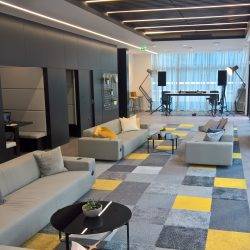April 24, 2019
Search Results for: financial
April 18, 2019
Ancient Greek wisdom for the leadership crisis of the 21st Century
by Emily Anhalt • Features
 What makes a good leader? This question confronts us at every election and with every domestic and international policy decision. As a professor of classical languages and literature for more than 30 years, I marvel at our insistence on addressing this question as if it were brand new. Centuries ago, myths helped the Greeks learn to reject tyrannical authority and identify the qualities of good leadership. As I write in my book Enraged, the same myths that long predate the world’s very first democracy have lessons for us today – just as they did for the ancient Greeks centuries ago. (more…)
What makes a good leader? This question confronts us at every election and with every domestic and international policy decision. As a professor of classical languages and literature for more than 30 years, I marvel at our insistence on addressing this question as if it were brand new. Centuries ago, myths helped the Greeks learn to reject tyrannical authority and identify the qualities of good leadership. As I write in my book Enraged, the same myths that long predate the world’s very first democracy have lessons for us today – just as they did for the ancient Greeks centuries ago. (more…)
April 18, 2019
Vast majority of stress not caused by work but home life
by George Eltringham • News, Wellbeing, Workplace
 Stress can be caused by numerous factors, but work often isn’t the main culprit, according to a report from The Health Insurance Group. The company runs regular forums for their staff to discuss their mental wellbeing, and life outside work consistently ranks as the biggest cause of stress. As businesses look to support the mental wellbeing of their staff, it’s important they recognise that support needs to extend to home life too – not just work. (more…)
Stress can be caused by numerous factors, but work often isn’t the main culprit, according to a report from The Health Insurance Group. The company runs regular forums for their staff to discuss their mental wellbeing, and life outside work consistently ranks as the biggest cause of stress. As businesses look to support the mental wellbeing of their staff, it’s important they recognise that support needs to extend to home life too – not just work. (more…)
April 15, 2019
Black and other minority workers more likely to be in insecure work, claims TUC
by Neil Franklin • News, Workplace
 Black and minority ethnic workers are far more likely to be trapped in temporary and insecure work, according to a new TUC analysis published to mark the start of its annual Black Workers Conference. The analysis claims to show how BME workers are faring worse than white workers in the jobs market. (more…)
Black and minority ethnic workers are far more likely to be trapped in temporary and insecure work, according to a new TUC analysis published to mark the start of its annual Black Workers Conference. The analysis claims to show how BME workers are faring worse than white workers in the jobs market. (more…)
April 12, 2019
Manchester is the number one tech location outside of London
by Marie Hillen • AI, Cities, Facilities management, News, Property, Technology
 The UK’s regional cities are competing harder than ever with London to become the location of choice for the tech sector. According to CBRE’s report ‘Tech Cities: Exploring tech hotspots in the UK regions’ Manchester ranks number one amongst the top 10 UK tech location outside of London, but Scotland features highly with Glasgow and Edinburgh in second and third position respectively. Birmingham has risen three places, from seventh to fourth position but smaller conurbations such as such as Reading, Oxford, Cambridge, Southampton, Brighton and Bracknell also feature, based on their concentrations of tech employment, tech businesses and high education levels. More cities are competing for the very top spots in the ranking
The UK’s regional cities are competing harder than ever with London to become the location of choice for the tech sector. According to CBRE’s report ‘Tech Cities: Exploring tech hotspots in the UK regions’ Manchester ranks number one amongst the top 10 UK tech location outside of London, but Scotland features highly with Glasgow and Edinburgh in second and third position respectively. Birmingham has risen three places, from seventh to fourth position but smaller conurbations such as such as Reading, Oxford, Cambridge, Southampton, Brighton and Bracknell also feature, based on their concentrations of tech employment, tech businesses and high education levels. More cities are competing for the very top spots in the ranking
April 11, 2019
Signs that somebody is about to quit are there nine months in advance
by Neil Franklin • News, Workplace
 The first signs that an employee is considering quitting appear clearly nine months before they actually depart, with declining loyalty as a key indicator, claims a study called The 9-month warning: understanding why people quit—before it’s too late (registration) from Peakon. Based on more than 33 million employee survey responses across 125 countries, the study also claims that the key factors that drive a person to quit include unchallenging work, the inability to discuss pay and no clear path for career/personal growth. In most cases, people quit because of poor managers, not because of colleagues or company culture, the study suggests. (more…)
The first signs that an employee is considering quitting appear clearly nine months before they actually depart, with declining loyalty as a key indicator, claims a study called The 9-month warning: understanding why people quit—before it’s too late (registration) from Peakon. Based on more than 33 million employee survey responses across 125 countries, the study also claims that the key factors that drive a person to quit include unchallenging work, the inability to discuss pay and no clear path for career/personal growth. In most cases, people quit because of poor managers, not because of colleagues or company culture, the study suggests. (more…)
April 8, 2019
Overhaul of shared parental leave is already overdue, claims TUC
by Mark Eltringham • Flexible working, News, Wellbeing
 The TUC is calling for an overhaul of shared parental leave legislation just four years after its introduction. Last year only 9,200 new parents took shared parental leave – just 1 percent of those eligible to do so. The TUC believes take-up is low because the scheme is so low-paid (£145.18 per week) making it unaffordable for most fathers. It claims that large numbers of dads in insecure work, such as agency workers and those on zero-hours contracts, are not eligible for it. And currently men and women who are self-employed don’t get any shared leave rights at all. (more…)
The TUC is calling for an overhaul of shared parental leave legislation just four years after its introduction. Last year only 9,200 new parents took shared parental leave – just 1 percent of those eligible to do so. The TUC believes take-up is low because the scheme is so low-paid (£145.18 per week) making it unaffordable for most fathers. It claims that large numbers of dads in insecure work, such as agency workers and those on zero-hours contracts, are not eligible for it. And currently men and women who are self-employed don’t get any shared leave rights at all. (more…)
April 3, 2019
London, Paris and Stockholm lead ranks of European coworking hotspots
by Neil Franklin • Coworking, News, Property
 London, Paris and Stockholm are among the major cities featured in a new research report from Cushman & Wakefield (registration) into the coworking and flexible office sectors, which pinpoints future demand and the next likely growth hotspots across Europe. According to the report, coworking’s rapid expansion in recent years has quickly disrupted global office markets. The report charts the current state of the sector, the emergence of flexible working space across continental Europe and where future growth will occur. (more…)
London, Paris and Stockholm are among the major cities featured in a new research report from Cushman & Wakefield (registration) into the coworking and flexible office sectors, which pinpoints future demand and the next likely growth hotspots across Europe. According to the report, coworking’s rapid expansion in recent years has quickly disrupted global office markets. The report charts the current state of the sector, the emergence of flexible working space across continental Europe and where future growth will occur. (more…)
April 3, 2019
Procurement fraud rampant in UK businesses
by George Eltringham • News, Technology
 Procurement fraud is widespread in the UK and the country lags behind many countries in its detection capabilities, new research from SAS claims. British companies, on average, lose significantly more money to procurement fraud, and the country is far more reliant on ineffective manual detection techniques than other nations.Procurement fraud occurs when employees and suppliers behave fraudulently during the contract bidding process or over the course of the contract. This can range from employees colluding with their preferred vendor to give unfair advantage during procurement, to suppliers submitting multiple invoices for a single item. While procurement fraud is a serious crime that carries a jail sentence in many countries, perpetrators are often willing to take the risk for personal revenge or financial gain. (more…)
Procurement fraud is widespread in the UK and the country lags behind many countries in its detection capabilities, new research from SAS claims. British companies, on average, lose significantly more money to procurement fraud, and the country is far more reliant on ineffective manual detection techniques than other nations.Procurement fraud occurs when employees and suppliers behave fraudulently during the contract bidding process or over the course of the contract. This can range from employees colluding with their preferred vendor to give unfair advantage during procurement, to suppliers submitting multiple invoices for a single item. While procurement fraud is a serious crime that carries a jail sentence in many countries, perpetrators are often willing to take the risk for personal revenge or financial gain. (more…)
March 29, 2019
Need for employee resilience heightened in a time of constant change
by George Eltringham • News, Workplace
 Challenges facing UK businesses in the next five years have heightened the need for employee resilience, according to new research from recruitment specialist Robert Half UK. As businesses adapt to an ongoing period of change, more than nine in 10 (94 percent) CFOs think developing resilience amongst their employees will be important over the next two to five years, with 43 percent citing this as very important. This is critical to almost all (97 percent) CFOs from London-based businesses – the UK’s financial hub. (more…)
Challenges facing UK businesses in the next five years have heightened the need for employee resilience, according to new research from recruitment specialist Robert Half UK. As businesses adapt to an ongoing period of change, more than nine in 10 (94 percent) CFOs think developing resilience amongst their employees will be important over the next two to five years, with 43 percent citing this as very important. This is critical to almost all (97 percent) CFOs from London-based businesses – the UK’s financial hub. (more…)
March 28, 2019
Millions more people say they would like to work as freelancers
by Sara Bean • Flexible working, News, Workplace
 The so-called gig economy is likely to increase dramatically over the next few years, new research suggests. Along with over 8 million people who currently work on a freelance basis, over 5 million more say they would like to go freelance. The data collated by Direct Line for Business claims that 5.3 million people (10 per cent) dream of becoming their own boss in the future, by embracing a career as a freelancer. This is in addition to the 8.6 million (16 per cent) who currently freelance and are either full time self-employed or carry out contract work alongside their main jobs.
The so-called gig economy is likely to increase dramatically over the next few years, new research suggests. Along with over 8 million people who currently work on a freelance basis, over 5 million more say they would like to go freelance. The data collated by Direct Line for Business claims that 5.3 million people (10 per cent) dream of becoming their own boss in the future, by embracing a career as a freelancer. This is in addition to the 8.6 million (16 per cent) who currently freelance and are either full time self-employed or carry out contract work alongside their main jobs.




























April 8, 2019
Navigating organisations through digital transformation
by Ian Tickle • Comment, Technology
(more…)